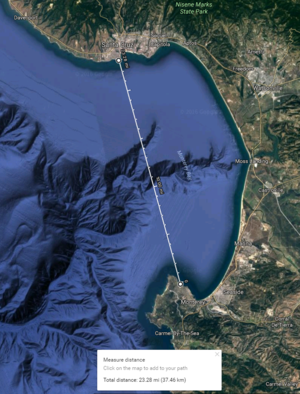Experimental Evidence
The following sections contain experimental evidence in favor of a Flat Earth.
Sinking Ship Effect
It is proven that the ship does not sink behind a hill of water, but that it is actually perspective which hides it. This demonstrates that the earth is not a globe. There have been experiments where half-sunken ships have been restored by simply looking at them through telescopes, showing that they are not actually hiding behind "hills of water".
Main article: Sinking Ship Effect
The English Mechanic
From The English Mechanic, a scientific journal:
|
The Bishop Experiment
California Monterey Bay is a relatively long bay that sits next to the Pacific Ocean. The distance between the extremes of the Monterey Bay, Lovers Point in Pacific Grove and Lighthouse State Beach in Santa Cruz, is just over 23 statute miles.
On a very clear and chilly day it is possible to see Lighthouse Beach from Lovers Point and vice versa. With a good telescope, laying down on the stomach at the edge of the shore on the Lovers Point beach 20 inches above the sea level it is possible to see people at the waters edge on the adjacent beach 23 miles away near the lighthouse. The entire beach is visible down to the water splashing upon the shore. Upon looking into the telescope I can see children running in and out of the water, splashing and playing. I can see people sun bathing at the shore and teenagers merrily throwing Frisbees to one another. I can see runners jogging along the water's edge with their dogs. From my vantage point the entire beach is visible.
IF the earth is a globe, and is 24,900 English statute miles in circumference, the surface of all standing water must have a certain degree of convexity--every part must be an arc of a circle. From the summit of any such arc there will exist a curvature or declination of 8 inches in the first statute mile. In the second mile the fall will be 32 inches; in the third mile, 72 inches, or 6 feet, as shown in this chart. Ergo; looking at the opposite beach over 23 miles away there should be a bulge of water over 350 feet tall blocking my view. There isn't.
Suppose that the earth is a sphere with a radius of 3,963 miles. If you are at a point P on the earth's surface and move tangent to the surface a distance of 1 mile then you can form a right angled triangle as in the diagram.
Looking over a distance of 1 mile, we can use the theorem of Pythagoras:
a2 = 3,9632 + 12 = 15,705,370
and when we square root that figure we get a = 3,963.000126 miles
Thus your position is 3,963.000126 - 3,963 = 0.000126 miles above the surface of the earth.
0.000126 miles = 12 in * 5,280 ft * 0.000126 mi = 7.98 inches
Hence after one mile the earth drops approximately 8 inches.
Ergo, looking across 23 miles the Pythagorean theorem becomes:
a2 = 39632 +232 = 15,705,898
and when we square root that figure we get a = 3,963.06674 miles
Thus your position is 3,963.06674 - 3,963 = 0.06674 miles above the surface of the earth
0.06674 miles = 5,280 ft/mi * 0.6674 mi = 352.3872 feet
Hence after 23 miles the earth drops approximately 352 feet.
There are a number of different methods to calculate the drop of the Round Earth. Go ahead and look some up try a few out. You will find that the drop while looking over 23 miles is on the order of 300-400 feet.
Further Flat Earth Evidence
- Professor Mark Fonstad of Southwest Texas University demonstrates that Kansas is Flatter than a Pancake
- Thomas Winship conducts numerous experiments in his work Zetetic Cosmogony.
- See Samuel Birley Rowbotham's work on the Bedford Canal and other British locations in his work Earth Not a Globe which demonstrates a Flat Earth: http://www.sacred-texts.com/earth/za/za00.htm
- A woman named Lady Blount was among the first to peer review Rowbotham's work: Lady Blount Trials
- In A hundred proofs the Earth is not a globe by William Carpenter there are a number of referenced experiments which demonstrates the earth's non-globularity.
- There are referenced experiments in the book "Terra Firma 1901" by David Wardlaw Scott which favor a Flat Earth: http://www.archive.org/details/cu31924031764594

